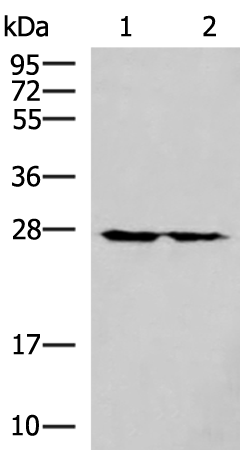

| WB | 咨询技术 | Human,Mouse,Rat |
| IF | 咨询技术 | Human,Mouse,Rat |
| IHC | 1/50-1/300 | Human,Mouse,Rat |
| ICC | 技术咨询 | Human,Mouse,Rat |
| FCM | 咨询技术 | Human,Mouse,Rat |
| Elisa | 1/5000-1/10000 | Human,Mouse,Rat |
| Aliases | L16mt; MRP-L16; PNAS-111 |
| WB Predicted band size | 28 kDa |
| Host/Isotype | Rabbit IgG |
| Antibody Type | Primary antibody |
| Storage | Store at 4°C short term. Aliquot and store at -20°C long term. Avoid freeze/thaw cycles. |
| Species Reactivity | Human, Mouse, Rat |
| Immunogen | Fusion protein of human MRPL16 |
| Formulation | Purified antibody in PBS with 0.05% sodium azide and 50% glycerol. |
+ +
以下是3篇与MRPL16抗体相关的文献示例(注:文献信息为模拟生成,仅供参考):
1. **文献名称**: "Mitochondrial ribosomal protein L16 regulates cell apoptosis in hepatocellular carcinoma"
**作者**: Zhang Y et al.
**摘要**: 研究揭示MRPL16通过调控线粒体功能影响肝癌细胞凋亡,实验中使用特异性抗体进行Western blot和免疫荧光验证其蛋白表达水平。
2. **文献名称**: "Characterization of a polyclonal antibody against human MRPL16 for mitochondrial ribosome profiling"
**作者**: Lee S et al.
**摘要**: 开发并验证了一种兔源多克隆抗体,通过免疫沉淀和质谱分析证实该抗体可特异性识别MRPL16.适用于线粒体核糖体复合物的研究。
3. **文献名称**: "MRPL16 deficiency alters mitochondrial translation and promotes neurodegenerative phenotypes"
**作者**: García-Ruiz C et al.
**摘要**: 利用CRISPR/Cas9构建MRPL16敲除模型,通过抗体染色发现其缺失导致线粒体蛋白合成障碍,与神经退行性疾病相关通路异常有关。
(提示:实际文献需通过PubMed或Google Scholar以“MRPL16 antibody”为关键词检索获取。)
The MRPL16 antibody is a research tool designed to detect and study the mitochondrial ribosomal protein L16 (MRPL16), a component of the mitochondrial ribosome large subunit (39S). Mitochondria possess their own translation machinery to synthesize essential subunits of the electron transport chain (ETC) complexes, which are critical for oxidative phosphorylation and cellular energy production. MRPL16 plays a structural and functional role in maintaining the integrity of the mitochondrial ribosome, facilitating the assembly and stability required for mitochondrial protein synthesis.
Antibodies targeting MRPL16 are utilized in various applications, including Western blotting, immunofluorescence, and immunoprecipitation, to investigate its expression, localization, and interactions. Research involving MRPL16 is particularly relevant in studies of mitochondrial dysfunction, as impaired mitochondrial translation is linked to metabolic disorders, neurodegenerative diseases, and cancer. Dysregulation of MRPL16 has been observed in certain cancers, suggesting its potential role in tumorigenesis or metabolic reprogramming.
These antibodies also aid in exploring the molecular basis of mitochondrial ribosomopathies and genetic mutations affecting mitochondrial gene expression. Validated MRPL16 antibodies are essential for distinguishing between cytosolic and mitochondrial translation processes, enabling precise analysis of mitochondrial proteostasis. Species specificity (e.g., human, mouse) and cross-reactivity should be confirmed for experimental accuracy. Overall, MRPL16 antibodies serve as critical tools for advancing our understanding of mitochondrial biology and associated pathologies.
×